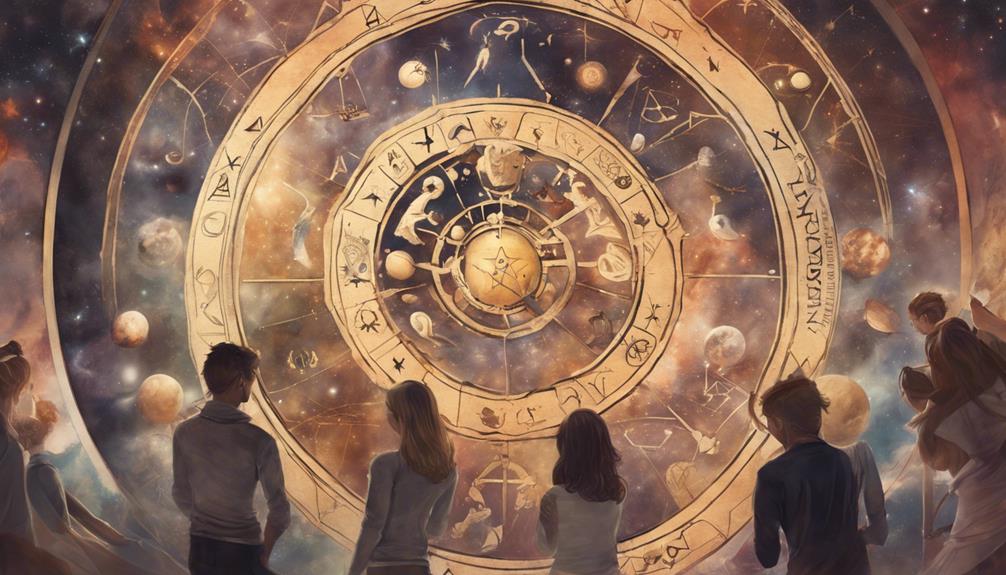How to Select the Right Thesis Advisor in Astrology Programs

Selecting the right thesis advisor is a crucial decision for students pursuing advanced degrees in astronomy or astrophysics. A thesis advisor plays a significant role in guiding and supporting students throughout their research and academic journey. It is essential to find an advisor who aligns with your research interests and academic goals.
Moreover, a good advisor should have a strong reputation in the field, possess relevant expertise, and be actively involved in research. Building a positive and productive relationship with your advisor is key to successfully completing your thesis and advancing in your academic and professional career. Therefore, take the time to research and meet with potential advisors before making a final decision.
Importance of Advisor Selection
Selecting the right thesis advisor in astrology programs is a crucial decision that can profoundly impact your academic journey and future career prospects. The mentorship dynamics established between you and your advisor will serve as the cornerstone of your academic progress and personal growth. Your advisor isn't just a guide but a vital support system, offering insights, encouragement, and expertise that can shape your research and overall experience.
When choosing an advisor, consider their approach to mentorship dynamics. Look for someone who aligns with your goals and values, fostering an environment where you can thrive. A supportive advisor can empower you to push boundaries, explore new ideas, and reach your full potential. Their guidance can catalyze your personal growth, nurturing not just your academic progress but also your confidence and skills.
Research Advisor's Expertise
As you embark on the journey of choosing a thesis advisor in astrology programs, consider the profound significance of your advisor's research background and publication record.
These elements not only reflect the depth of their expertise but also indicate their commitment to advancing knowledge in the field.
Therefore, be vigilant in assessing these aspects to ensure a fruitful and enlightening research partnership.
Advisor's Research Background
When evaluating potential thesis advisors in astrology programs, it's crucial to thoroughly examine the research background and expertise of each advisor to make an informed decision. Consider their research experience, delving into the depth of their academic qualifications.
A seasoned advisor with a robust research background can offer valuable insights, guidance, and support throughout your academic journey. Their expertise will shape the direction of your thesis, influencing its quality and relevance. By aligning with an advisor whose research aligns with your interests and goals, you're setting yourself up for success.
Advisor's Publication Record
Delve into your potential advisor's publication record to gain insight into their expertise and contribution to the field of astrology, guiding your decision-making process.
Consider the following aspects:
- Citation Analysis: Look at the number of times your potential advisor's work has been cited. A higher citation count often indicates the impact and relevance of their research in the field.
- Research Impact: Evaluate the significance of your advisor's research on the advancement of astrology. Assess how their work has influenced the field and contributed to its growth.
- Collaboration Potential, Academic Network: Explore the potential for collaboration with other researchers based on your advisor's connections within the academic community. A strong academic network can offer opportunities for a more enriching research experience.
Compatibility and Communication
As you embark on the journey of selecting a thesis advisor in Astrology programs, consider the importance of compatibility and communication.
Look for a zodiac sign match that aligns with your own to foster understanding and harmony.
Prioritize open communication channels and shared research interests to ensure a fruitful and collaborative mentorship experience.
Zodiac Sign Match
Exploring the compatibility and communication dynamics between different zodiac signs plays a crucial role in selecting an ideal thesis advisor for astrology programs. When considering the zodiac sign match for your advisor, remember these key points:
- Celestial Compatibility: Understanding how your zodiac sign aligns with your advisor's can enhance research collaboration.
- Zodiac Synergy: Seek an advisor whose zodiac sign complements yours for a harmonious academic partnership.
- Effective Communication: Communication styles between zodiac signs vary; find an advisor whose communication style resonates with yours for a seamless collaboration experience.
Open Communication Channels
To foster a strong academic relationship in astrology programs, establishing open communication channels that align with both your and your advisor's communication styles is paramount. Trust building and conflict resolution are essential components of this partnership. By nurturing an environment where honest conversations can thrive, you pave the way for mutual understanding and respect. Remember, effective communication is a two-way street; listen attentively and express your thoughts clearly. Below is a table to guide you in enhancing your communication channels with your thesis advisor:
| Communication Style | Tips for Enhancement | Advisor's Perspective |
|---|---|---|
| Direct | Be concise and specific | Appreciates clarity |
| Indirect | Use examples and anecdotes | Values storytelling |
| Visual | Utilize charts and diagrams | Prefers visual aids |
Employing these strategies will strengthen your academic bond and lead to a more fulfilling research journey.
Enhancing your academic journey in astrology programs involves aligning your research interests with your advisor's, focusing on compatibility, and fostering effective communication to ensure a harmonious collaboration.
When choosing a thesis advisor, consider the following:
- Research Collaboration: Seek an advisor who values collaboration and is willing to engage in joint research projects to enhance your academic experience.
- Academic Synergy: Look for common interests and shared goals with your advisor to create a productive and harmonious working relationship.
- Effective Communication: Prioritize open and clear communication channels with your advisor to facilitate understanding and avoid misunderstandings in your research endeavors.
Track Record of Success
When choosing a thesis advisor in astrology programs, assessing their track record of success is paramount to your academic journey. The legacy of accomplishments and the ability to guide aspiring astrologers towards their goals are essential factors to consider. A successful track record signifies not only the advisor's expertise but also their commitment to nurturing talent and fostering growth. As you embark on this crucial decision-making process, delve into their previous collaborations and academic reputation to gain insight into their effectiveness as a mentor.
| Track Record of Success | |
|---|---|
| Key Considerations | |
| Previous Collaborations | |
| Academic Reputation | |
| Benefits | |
| Insights into Mentor's Effectiveness | |
| Guidance towards Achieving Goals |
Availability and Accessibility
Consider the accessibility and availability of your prospective thesis advisor as crucial factors in ensuring a smooth and productive academic journey in astrology programs. Ensuring that your advisor is reachable and approachable can greatly impact your progress and satisfaction throughout your thesis work. When evaluating their availability, keep in mind the following key aspects:
- Time Management and Scheduling: A responsive advisor who respects your time and theirs is essential for maintaining a structured workflow and meeting deadlines effectively. Clear communication about expectations and timelines is vital for a successful collaboration.
- Remote Accessibility and Virtual Meetings: In today's interconnected world, the ability to connect virtually with your advisor can enhance flexibility and convenience. Ensure your advisor is comfortable with remote communication methods and can accommodate virtual meetings when necessary.
- Support and Guidance: Beyond just being available, a great advisor offers meaningful support and guidance. Look for someone who not only responds promptly but also provides valuable insights, constructive feedback, and encouragement along the way.
Alignment With Research Interests
To ensure a fruitful academic journey in astrology programs, it's essential to align yourself with a thesis advisor who shares your research interests. Research focus and compatibility are paramount when selecting an advisor. Your advisor shouldn't only understand but also resonate with the topics that captivate your curiosity. When your interests align, the potential for meaningful collaboration and insightful guidance increases exponentially.
Effective advisor communication is key to establishing this alignment. Open and clear discussions about your research focus will help gauge if your interests harmonize. Seek an advisor who not only listens but also offers valuable input that complements your ideas. The shared passion for the subject will create a harmonious academic environment where both parties can thrive and learn from each other.
Establish Expectations and Boundaries
Have you clearly defined your expectations and boundaries with your thesis advisor in your astrology program? Setting expectations and establishing boundaries are crucial steps in fostering a healthy and productive advisor-student relationship. Here are three key points to consider:
- Open Communication: Ensure there's transparent communication regarding your academic goals, preferred communication methods, and meeting schedules. This will help both you and your advisor stay on the same page throughout your thesis journey.
- Mutual Respect: Respect is a two-way street. Clearly outline what you expect in terms of feedback, response times, and professional conduct. Likewise, be mindful of your advisor's time and expertise.
- Flexibility: While setting boundaries is important, remain flexible and open to constructive feedback and suggestions. Finding a balance between structure and adaptability can lead to a more enriching academic experience.
Frequently Asked Questions
How Can I Ensure That My Thesis Advisor Will Be Able to Provide Me With the Necessary Resources for My Research?
To ensure your thesis advisor provides necessary resources, seek someone with proven resource availability and high mentorship level. Prioritize effective conflict resolution and clear research guidance. Your advisor must support and guide you throughout your academic journey.
What Are Some Strategies for Dealing With Potential Conflicts That May Arise Between Me and My Thesis Advisor?
Navigating conflicts with your thesis advisor requires open communication and understanding. Setting clear expectations and asserting your research independence can mitigate potential issues. Remember, conflict resolution is key to a harmonious advisor-student relationship.
How Can I Gauge the Level of Mentorship and Support I Can Expect From a Potential Thesis Advisor?
To gauge the mentorship and support from a potential thesis advisor, observe their responsiveness, willingness to provide guidance, and track record with past students. Manage expectations by discussing goals upfront and use clear communication strategies for a harmonious partnership.
Are There Any Red Flags to Watch Out for When Selecting a Thesis Advisor in an Astrology Program?
When selecting a thesis advisor in astrology programs, watch for red flags like poor communication, lack of interest, or a mismatch in research goals. Trust your instincts, seek advisor compatibility, and prioritize clear communication.
How Can I Balance My Own Research Interests With the Guidance and Direction Provided by My Thesis Advisor?
To balance your research autonomy with your advisor's guidance, align your personal interests with their expertise. Communicate openly, set clear boundaries, and collaborate on a plan that respects both your independence and their mentorship. Trust the symbiotic relationship to flourish.











